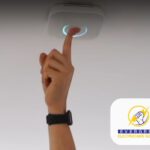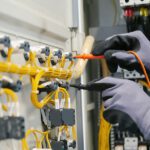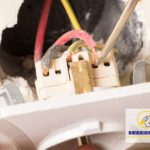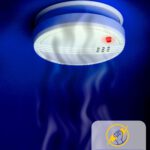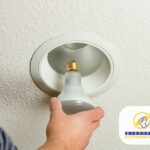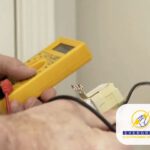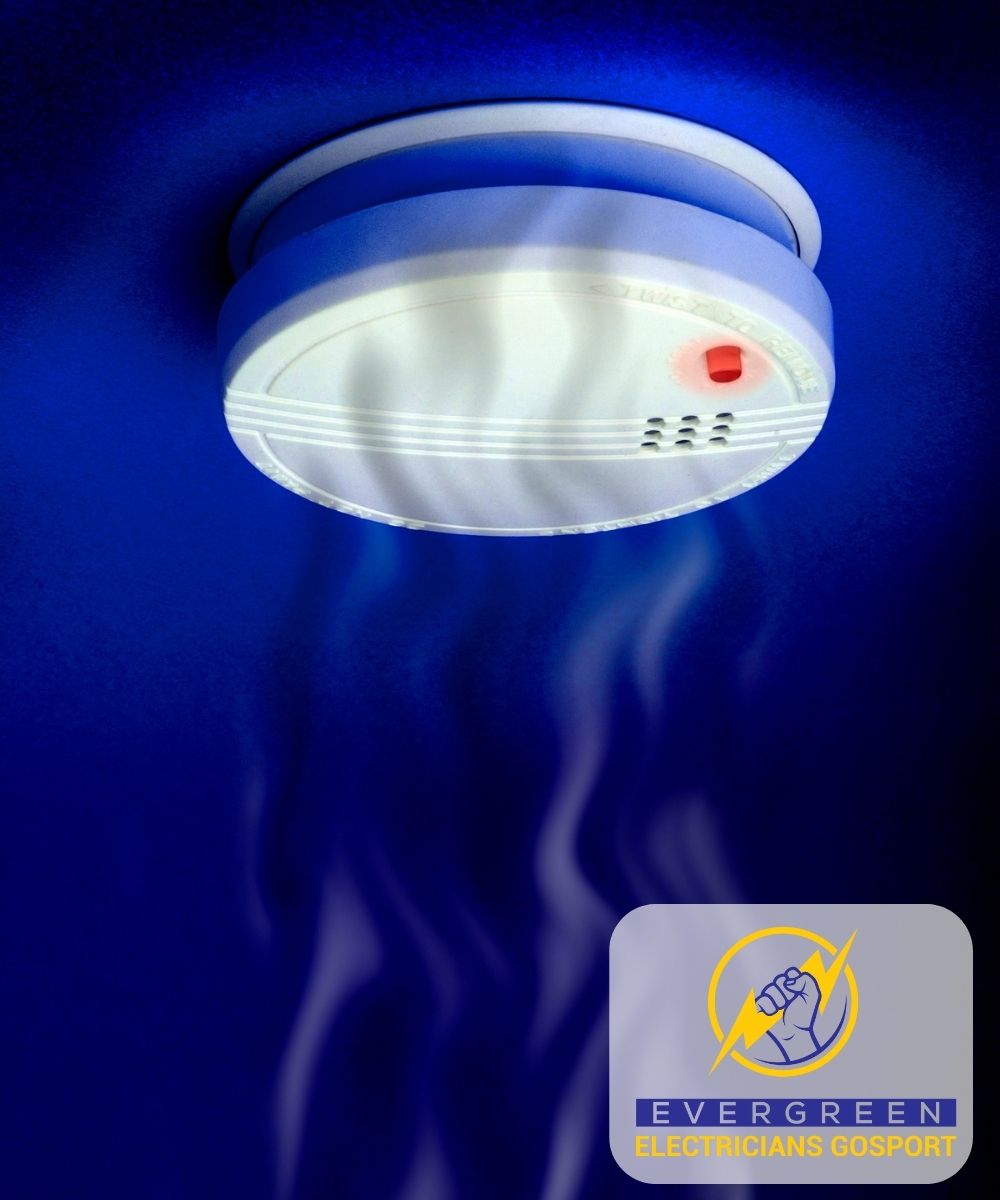Are you ready to shed light on the hidden dangers lurking in your home?
In this article, we’ll delve into the common electrical hazards that could put you and your loved ones at risk. From faulty wiring to overloaded circuits, these hazards can have devastating consequences if left unchecked.
But don’t fear; we have the power to prevent them! By taking proactive measures and implementing safety precautions, you can safeguard your home and create a haven of innovation.
Discover how to identify and rectify issues such as damaged power cords, improper use of electrical appliances, and the absence of Ground Fault Circuit Interrupters (GFCIs).
So, let’s buckle up and prepare to navigate the electrifying world of home safety. Together, let’s spark a new era of innovative safety in your home!
Faulty Wiring
You need to be aware of faulty wiring, as it can silently pose a serious risk to your safety and the welfare of your home. Preventing faulty wiring accidents is essential, so it’s important to know how to recognize signs of faulty wiring.
Look out for flickering lights, regularly blown fuses, or discolored outlets, as these can indicate a wiring issue. If you spot any of these signs, it’s vital to act swiftly to prevent potential electrical hazards. First, switch off the power to the affected area and then contact a qualified electrician to assess and repair the problem.
By addressing faulty wiring promptly, you can ensure the safety of your home and avoid further damage.
Now let’s move on to the next section about overloaded circuits.
Overloaded Circuits
To avoid overloading outlets and extension cords, limit the number of electrical appliances and devices you plug in. Spread them across multiple circuits to distribute the electrical load.
Overloading can cause overheating and fires, so be aware of the electricity used.
Avoid Overloading Outlets and Extension Cords
Be mindful of the dangers of overloading sockets and extension leads, as they can lead to devastating electrical fires and put your family at risk.
To avoid overloading power strips and extension leads, it’s important to use surge protectors. Surge protectors are designed to handle a higher electrical load and can help prevent overheating and short circuits.
When using power strips or extension leads, make sure to distribute the load evenly across multiple sockets. Avoid plugging too many appliances or devices into a single socket or extension lead.
By spreading out electrical appliances and devices across multiple circuits, you can reduce the risk of overloading and minimize the chances of electrical hazards. This will help ensure the safety of your home and protect your family from potential electrical accidents.
Spread Out Electrical Appliances and Devices Across Multiple Circuits
When spreading out electrical appliances and devices across multiple circuits, it may require extra effort to rearrange your home’s layout, but it will reduce the risk of overloading and potential electrical accidents.
Spatial organisation is key to ensure electrical safety. By distributing your appliances and devices across different circuits, you prevent excessive power demands on one circuit, reducing the chances of overheating and short circuits. You may need to strategically place outlets and extension cords in different areas of your home.
Following electrical safety guidelines, such as not daisy-chaining extension cords and avoiding the use of power strips for high-power appliances, will further increase safety. By doing this, you create a safer environment and reduce the risk of electrical fires.
Electrical Fires
To prevent electrical fires in your home, it’s essential to fit smoke alarms and fire extinguishers. These can detect and extinguish fires early, reducing damage and potential harm.
Moreover, taking care when using electrical appliances and devices, such as unplugging them when not in use and not overloading sockets, can greatly reduce the risk of electrical fires.
Install Smoke Alarms and Fire Extinguishers
Make sure you’ve got smoke alarms and fire extinguishers installed in your home to protect against potential fires. Here are three important reasons why:
- Early detection: Smoke alarms are crucial in detecting smoke or fire early on, giving you valuable time to evacuate and call for help.
- Quick response: Having fire extinguishers easily accessible allows you to respond quickly to small fires, preventing them from spreading and causing significant damage.
- Peace of mind: Having smoke alarms and fire extinguishers in place provides you with assurance that you’ve taken proactive steps to safeguard your home and family.
It’s essential to regularly test and maintain your fire alarms to guarantee they’re working correctly. Plus, make sure your fire extinguishers are easily accessible and haven’t expired.
Once you’ve taken these precautions, you can move on to practicing safe habits when using electrical appliances and devices.
Practice Safe Habits When Using Electrical Appliances and Devices
Using electrical appliances and devices safely not only protects your home and family, but also ensures the longevity and efficiency of your equipment. To practice safe habits, always unplug appliances when not in use, as leaving them plugged in can increase the risk of electrical fires.
Additionally, avoid overloading power sockets by using extension cords sparingly, and never plugging multiple high-wattage appliances into the same one. It is also important to check cords and cables regularly for any signs of wear or damage, such as fraying or exposed wires, and replace them promptly.
Additionally, be cautious when using electrical devices near water sources, as water and electricity are a dangerous combination. By following these safe practices and electrical safety tips, you can greatly reduce the risk of electrical hazards and ensure a safer home environment.
Now, let’s move on to the next section about damaged power cords.
Damaged Power Cords
Inspect your power cords regularly to spot any signs of damage or wear, as these can be a serious electrical hazard in your home. To keep a safe electrical environment, it’s essential to prevent power cord damage. Avoid bending or twisting the cord excessively, pulling on the cord to unplug appliances, or running it under carpets or rugs.
Damaged power cords could lead to electric shocks or even fires, so it’s vital to address any issues straight away. If you see frayed wires, exposed conductors, or loose connections, replace the cord immediately.
By taking these precautions, you can reduce the risk of electrical accidents in your home. It’s also essential to be aware of the incorrect use of electrical appliances.
Improper Use of Electrical Appliances
To ensure the safety of your family and create a safe environment, adopt a conscientious attitude when it comes to using electrical appliances. Electrical safety guidelines are essential to prevent accidents and maintain the longevity of your equipment.
Regular maintenance is paramount to keep them in good condition. First, inspect the cords and plugs for any signs of damage, like fraying or exposed wires. Ensure you always unplug appliances when not in use and avoid overloading power sockets. In addition, never use appliances with wet hands or near water sources.
By following these electrical safety guidelines and carrying out regular maintenance, you can reduce the risk of electrical hazards in the home.
Moving onto the subsequent section about the lack of ground fault circuit interrupters (GFCIs), it’s essential to address this possible hazard.
Lack of Ground Fault Circuit Interrupters (GFCIs)
Install ground fault circuit interrupters (GFCIs) in your home to protect yourself and your loved ones. GFCIs detect imbalances in electrical currents and shut off the power to prevent potential injuries or fatalities. GFCIs offer the following benefits in the UK:
- Enhanced safety: GFCIs provide an extra layer of protection by quickly detecting and interrupting electrical faults, reducing the risk of electrical shock.
- Compliance with regulations: It’s mandatory to have GFCIs installed in certain areas of the home, such as kitchens, bathrooms, and outdoor outlets.
For effective GFCI installation and usage, ensure the following safety guidelines are followed:
- Regular testing: Test your GFCIs monthly to ensure they’re functioning properly. Press the ‘test’ button to make sure the power is cut off.
- Professional installation: Hire a qualified electrician to install GFCIs for proper installation and functionality.
By installing GFCIs and following these safety guidelines, you can provide a safer environment for your family.
Frequently Asked Questions
How can I identify if there is faulty wiring in my home?
To identify faulty wiring in your home, look out for signs such as flickering lights, frequently tripped circuit breakers, or discoloured outlets.
You can also check for hot or buzzing outlets, burning smells, or loose connections.
It’s essential to hire a licensed electrician to safely diagnose and repair the issue. Don’t attempt to fix it yourself, as it can be hazardous and may lead to further electrical hazards.
What are the potential dangers of using damaged power cords?
Identify damaged power cords to avoid electrical shocks. Look for frayed or exposed wires, loose or damaged plugs, and signs of overheating such as melted insulation or discoloration.
Replace any damaged cords straight away to avert potential dangers. To prevent electrical shocks, always unplug appliances by gripping the plug, not the cord. Regularly check cords for signs of wear and tear, and don’t overload sockets.
Implementing these practices will keep your home safe and protect against electrical hazards.
Is there a way to prevent electrical fires from occurring?
To prevent electrical fires in the UK, it’s essential to prioritize electrical safety in the home.
Did you know that electrical fires cause roughly 25,000 house fires each year? Taking a few precautions can help avoid becoming a statistic.
Regularly inspect your electrical system and repair any damaged or frayed wires. Do not overload outlets and use surge protectors to protect your electronics.
Taking these steps will help create a safe and innovative living environment.
How can I check if my electrical appliances are being used improperly?
To check if your electrical appliances are being used improperly, there are a few steps you can take.
Ensure all cords and plugs are in good condition, without frays or damage.
Regularly inspect outlets for overheating or loose connections.
Fit childproof outlet covers to prevent young children from sticking objects in.
Educate children about electrical safety and set clear rules for using appliances.
Following these electrical safety tips and checking for misuse can help keep your home safe.
What are the benefits of installing Ground Fault Circuit Interrupters (GFCIs) in my home?
Installing ground fault circuit interrupters (GFCIs) in your home has numerous benefits. Firstly, they offer enhanced electrical safety, rapidly cutting off power in the event of a ground fault, preventing electric shocks and potential fires.
Secondly, these are highly advanced devices, detecting the slightest fluctuations in electrical currents. This guarantees maximum protection for you and your family.
Emphasizing the importance of electrical safety, GFCIs provide peace of mind and a safer home environment.


